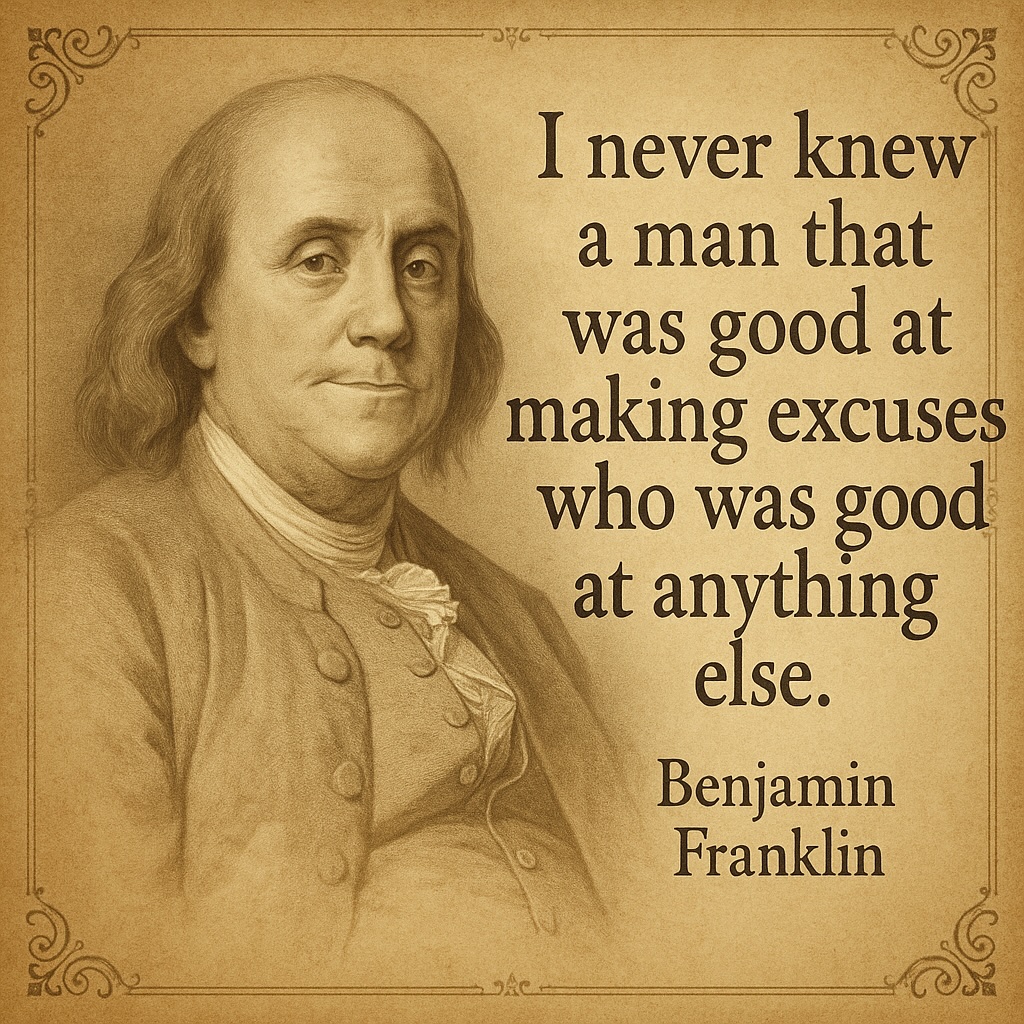
Benjamin Franklin, a towering figure of ingenuity and pragmatism, once astutely observed, “I never knew a man that was good at making excuses who was good at anything else.” This centuries-old insight remains strikingly relevant, particularly in the realm of leadership.
Franklin’s words cut to the core of a fundamental truth: a leader’s effectiveness is inversely proportional to their tendency to make excuses.
In today’s fast-paced and demanding environment, the temptation to deflect blame or justify shortcomings can be strong. However, for those in leadership positions, succumbing to this temptation is a sure path to eroding trust, fostering a culture of mediocrity, and ultimately, derailing success.
Contemporary research and organizational psychology strongly corroborate this, highlighting the tangible damage caused by the propensity to give excuses versus the profound benefits of accountable leadership.
The Corrosive Impact of Excuses in Leadership
- Erosion of Trust: When leaders make excuses, they signal a lack of ownership and accountability. Team members lose faith in a leader who consistently points fingers or cites external factors for failures rather than taking responsibility. Trust, once lost, is incredibly difficult to rebuild. As renowned researcher and author Brené Brown discusses in her book Dare to Lead, trust is built in small, consistent moments (the “marble jar” analogy), and consistently deflecting responsibility fractures that trust.
- Cultivating a Culture of Blame, Not Solutions: Excuse-making is contagious. If a leader models this behavior, it invariably trickles down creating an environment where passing the buck becomes the norm. Research published in journals like the Journal of Organizational Behavior and related studies on organizational climate often highlight that excuse making/blame cultures are associated with lower employee morale, reduced cooperation, and decreased organizational performance. Additionally, studies examining organizational justice and fairness (e.g., “The Detrimental Effects of Workplace Incivility on Employee Well-being and Performance”) indirectly support the idea that a culture rife with blame and excuses (the opposite of fairness and accountability) is damaging. Instead of focusing on solutions, energy is expended on assigning blame, hindering innovation.
- Impeding Progress and Organizational Learning: Excuses are roadblocks to improvement. By not acknowledging their role in setbacks, leaders miss crucial opportunities to learn, adapt, and develop more effective strategies. Acknowledging failures, analyzing them, and implementing corrective actions are hallmarks of strong leadership. The concept of a “learning organization,” powerfully articulated by Peter Senge in his seminal work The Fifth Discipline: The Art & Practice of The Learning Organization, emphasizes the importance of continuous learning and adaptation through reflection and honest assessment. Excuse-making is antithetical to this. Amy C. Edmondson, a Harvard Business School professor and author of The Fearless Organization: Creating Psychological Safety in the Workplace for Learning, Innovation, and Growth, extensively writes about how framing failures as learning opportunities is critical – a stance an excuse-making leader cannot genuinely model.
- Diminished Credibility and Respect: Leaders who are quick with an excuse but slow to find solutions lose the respect of their teams, peers, and superiors. True leadership commands respect through integrity, resilience, and a commitment to results, not through a well-crafted alibi. In their landmark book The Leadership Challenge, James M. Kouzes and Barry Z. Posner identify “Credibility” as the foundation of leadership. Leaders who make excuses are seen as lacking integrity, a core element of credibility.
- Lowered Standards and Expectations (The “Pygmalion Effect” in Reverse): Consistently making or accepting excuses inadvertently lowers the bar for performance. It signals that mediocrity is acceptable and that achieving goals is secondary to justifying why they weren’t met. This can create a negative Pygmalion effect, a concept famously explored by J. Sterling Livingston in his Harvard Business Review article “Pygmalion in Management.” The article details how managerial expectations directly influence employee performance; if leaders signal through excuses that subpar outcomes are acceptable, performance will likely decline.
Embracing Accountability: The Research-Supported Hallmark of Effective Leadership
Conversely, leaders who embody accountability inspire and empower their teams, a notion strongly supported by empirical evidence:
- Ownership Breeds Empowerment and Performance: Taking responsibility places the leader in a position of power – the power to learn, to change, and to lead the team towards a better outcome, to drive change. The Center for Creative Leadership (CCL), in various publications and research reports (such as those focusing on “Accountability in the Workplace”), highlights that accountability — NOT EXCUSES—is a key differentiator for successful leaders and is directly linked to higher team engagement and performance.
- Transparency Builds Trust and Engagement: Openly acknowledging challenges and mistakes fosters honesty and trust. Research published in academic journals such as Leadership Quarterly and the Journal of Business Ethics frequently links transparent leadership practices with increased employee satisfaction, trust, engagement, and organizational commitment. When leaders are open about their own fallibility, it encourages a more open and trusting environment.
- Solutions-Focused Leadership Drives Innovation: Accountable leaders focus on finding solutions instead of excusing failures. Studies on organizational agility and resilience emphasize the importance of leaders who can quickly identify issues, take ownership, and mobilize teams to implement solutions, rather than getting bogged down in blame.
- Leading by Example Sets the Cultural Tone: When leaders demonstrate accountability, they model a powerful example. The well-established “shadow of the leader” concept, discussed in leadership literature, posits that a leader’s behaviors and attitudes significantly shape the team’s norms and the broader organizational culture. Accountable actions cast a positive shadow.
Moving Beyond Excuses: A Call to Action for Leaders
Benjamin Franklin’s observation, amplified by decades of leadership research, serves as a potent reminder. The path to becoming “good at anything else”—inspiring teams, driving innovation, achieving goals—begins by abandoning excuses. In leadership—and in life—the moment you stop pointing fingers and start accepting responsibility is the moment you unlock true growth.
Great leaders:
- Embrace Accountability. When things go well, credit your team; when they don’t, ask “What could I have done differently?”
- Model Integrity. Excuses erode trust. By facing setbacks head-on, you show others that honesty and action matter more than saving face.
- Cultivate Solutions. Rather than rehearsing excuses why something won’t or didn’t work, invest energy in “How can we make it work?”
- Learn Fast and Move On. Mistakes are inevitable. The fastest way through them is to acknowledge, learn, and iterate—no detours in the blame game.
Every excuse is a roadblock on your path to excellence. As a leader, your team watches how you handle pressure. Do you lean into the problem or lean away? Do you create momentum or stagnation?
Leaders must cultivate radical ownership. By fostering a culture of accountability, grounded in psychological safety (Edmondson) and a commitment to learning (Senge), leaders create a culture enabling the achievement of truly remarkable results.
The choice is clear, and its impact well-documented: leaders can be masters of alibis and excuses, undermining trust and performance, OR masters of their “leadership craft”, building resilient, high-achieving teams. As Franklin wisely noted, and research from institutions like Google, Harvard, and leading thinkers like Brown, Senge, Kouzes, and Posner confirms, it’s nearly impossible to be both.
Today, challenge yourself to own one decision or outcome you’d normally sidestep. Share it with your team, outline your next steps, and watch how accountability inspires action—both in you and those who follow you.
Let’s lead by example, not by excuse. 💪🚀
Key Resources & Further Reading:
- Brown, B. (2018). Dare to Lead: Brave Work. Tough Conversations. Whole Hearts. Random House.
- Edmondson, A. C. (2019). The Fearless Organization: Creating Psychological Safety in the Workplace for Learning, Innovation, and Growth. John Wiley & Sons.
- Google’s re:Work. “Understand team effectiveness.” (Accessible via re.work.withgoogle.com)
- Kouzes, J. M., & Posner, B. Z. (2017). The Leadership Challenge: How to Make Extraordinary Things Happen in Organizations (6th ed.). John Wiley & Sons.
- Livingston, J. S. (1969, repr. 1988). “Pygmalion in Management.” Harvard Business Review.
- Senge, P. M. (2006). The Fifth Discipline: The Art & Practice of The Learning Organization. Doubleday/Currency.
- Publications from the Center for Creative Leadership (CCL) on accountability.
